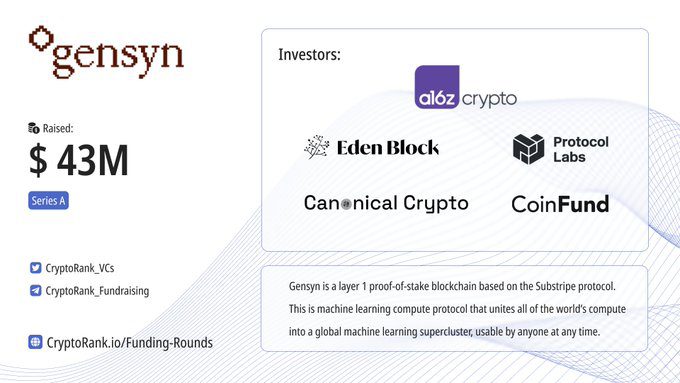TL;DR:
- Gensyn AI, a UK-based company, secures $43 million in Series A funding led by a16z crypto.
- The funding aims to empower developers with a pay-as-you-go model for creating AI tools.
- Gensyn AI functions as a decentralized machine learning compute protocol, connecting global machine learning capable hardware.
- The company addresses the challenge of verifying the proper execution of computational tasks.
- Gensyn operates as a layer one proof-of-stake blockchain based on the Substrate protocol.
- The funding round includes contributions from CoinFund, Canonical Crypto, Protocol Labs, Eden Block, and angel investors.
- The partnership aims to democratize AI and make infrastructure more widely accessible.
- Gensyn AI focuses on machine learning and deep learning, providing a decentralized trust layer.
- The funding will support team expansion, production costs, and the launch of a test network.
- Gensyn’s collaboration with a16z signifies a pivotal milestone in their journey to build groundbreaking solutions.
Main AI News:
In the midst of the tech industry’s AI-focused craze, machine learning companies are tirelessly striving to leverage the potential of decentralized technology. Gensyn AI, a UK-based firm founded in 2020 by Ben Fielding and Harry Grieve, has recently secured an impressive $43 million in Series A funding. Leading the investment round is a16z crypto, demonstrating their confidence in Gensyn AI’s mission to empower developers with a pay-as-you-go model for creating AI tools.
At its core, Gensyn AI functions as a decentralized machine learning compute protocol, as explained by co-founder Ben Fielding. The company’s vision is to establish connectivity among all machine learning capable compute hardware worldwide, including GPUs and CPUs, making them easily accessible to engineers, researchers, and academics alike. However, Fielding emphasizes that a major hurdle lies in ensuring the proper execution of computational tasks on these devices—a challenge Gensyn has adeptly addressed, particularly for machine learning training.
According to Grieve, Gensyn operates as a layer one proof-of-stake blockchain based on the Substrate protocol. By adopting this framework, Gensyn achieves scalability without limitations and boasts remarkably low verification overhead. These qualities position the company as an appealing solution for developers seeking to harness the power of decentralized machine learning.
Joining a16z in this significant fundraising round are notable contributors such as CoinFund, Canonical Crypto, Protocol Labs, Eden Block, and several angel investors. Their involvement signifies a shared belief in democratizing AI and unlocking its substantial productivity gains for entrepreneurs aspiring to train models at scale.
Ali Yahya, the general partner at a16z crypto, expressed enthusiasm for partnering with Gensyn on this crucial endeavor, stating, “We share Harry and Ben’s belief in democratizing AI and ensuring that the massive potential productivity gains are available to any talented entrepreneur who wants to train a new model at scale.”
While the AI landscape has experienced rapid advancements since the introduction of ChatGPT in November, Grieve underscores that Gensyn AI remains firmly rooted in its identity as a machine learning company. Rather than approaching the field solely from a cryptocurrency perspective, Gensyn prioritizes addressing a critical machine learning problem by establishing a decentralized trust layer.
The secured funding will support various initiatives, including the expansion of the Gensyn AI team and covering production costs, such as the upcoming launch of a test network later this year. Yahya affirms the importance of accessible AI infrastructure, acknowledging the computational power advantage currently enjoyed by tech giants, and highlights a16z’s commitment to democratizing AI.
This recent investment marks a16z’s continued interest in artificial intelligence, following their March investment in chatbot developer Character AI. Sarah Wang, a general partner at a16z, joined Character AI’s board as part of that investment.
Fielding reflects on this funding round as a significant turning point for Gensyn AI. While the company has been focused on research and identifying the necessary building blocks for its vision, they now recognize the immense scale and resources required to realize its goals. Fielding expresses excitement about partnering with Andreessen Horowitz, widely regarded as the industry’s premier partner, and believes it will enable Gensyn to create something truly groundbreaking.
Conclusion:
Gensyn AI’s successful funding round and partnership with a16z crypto highlight the increasing demand for decentralized machine learning solutions. This development signifies the growing interest in democratizing AI and making its infrastructure accessible to a broader range of entrepreneurs. Gensyn’s innovative approach, addressing the challenge of task verification, positions them as a key player in the market. With substantial financial backing and strategic alliances, Gensyn AI is well-positioned to drive innovation, foster collaboration, and revolutionize the AI landscape.

